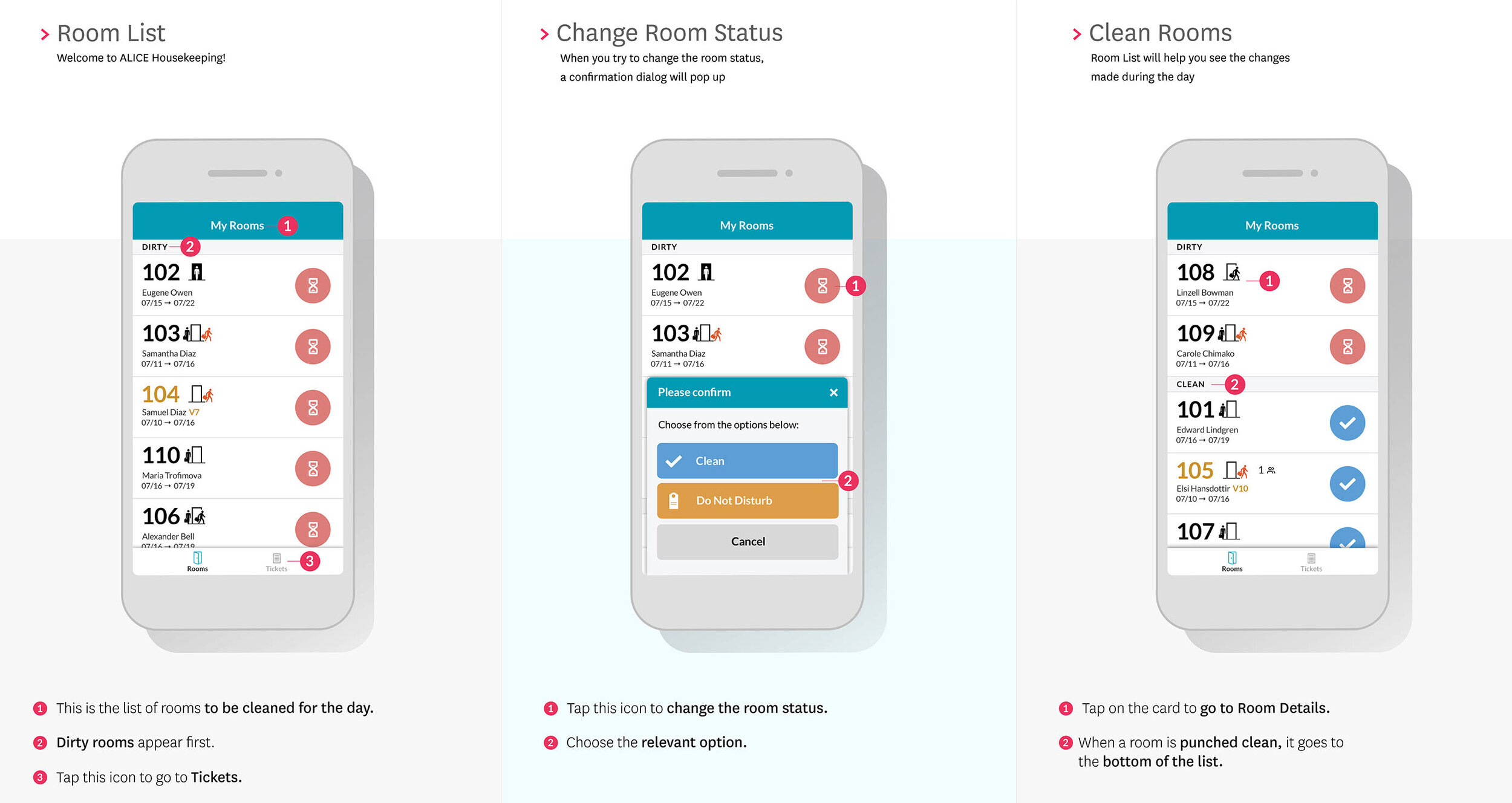ALICE Housekeeping
A DESKTOP and MOBILE PRODUCT that helps hotel Housekeeping staff become more efficient by optimizing room assignments and communication between departments.
Role: Lead Product Designer and Researcher
Team: 3 Product Designers
Year: 2019
🏆 2x IxDA 2020 Award Winner
What is ALICE Housekeeping?
ALICE Housekeeping is a module of the ALICE Platform, a web-based software that aims to optimize hotel staff operations across departments and improve communication with guests. With ALICE Housekeeping, a hotel can enhance its room assignment process and inter-departmental coordination for faster resolution of guest requests and room turnover.
Context
Housekeeping is the department that employs the most people in any hotel and that has the most complex operations. Housekeeping managers spend up to 3h-day assigning rooms to be cleaned. Housekeeping supervisors spend their days walking around hallways trying to find room attendants to communicate updates to their assignments. Room attendants rely on paper task sheets and cannot communicate with their managers when something doesn’t go as expected.
This whole operation is frustrating, expensive, and inefficient.
How might we improve efficiency and communication in the housekeeping department while increasing guest satisfaction?
Solution
ALICE Housekeeping streamlines daily room assignments through a web application available on desktop and mobile devices. The product eliminates the need for paper task sheets and radio communication while speeding up the room assignment process from 3h to 30 minutes. It creates a direct line of communication between housekeeping managers, supervisors, and room attendants, improves the transparency of the department’s operation, and ultimately gets guests into rooms faster.
The Users
Housekeeping Manager
Room Attendant
Housekeeping Supervisor
Research Approach
Competitive Landscape
The matrix below illustrates how the market is currently dominated by Opera, a property management system that has been around for decades. The experience in Opera is very manual and the room assignment tasks are paper task sheets.
Design Process
In our design process, we created 3 products for 3 different users:
ALICE Room Assignment Desktop: Housekeeping Manager
ALICE Supervisor APP: Housekeeping Manager/Floor Supervisor
ALICE Room Attendant APP: Room Attendant
Storyboards
We started by mapping the day-by-day of these users with storyboards. These visual tools were also very helpful when communicating with engineers and QA during the development phase.
Storyboard Housekeeping Manager
Storyboard Housekeeping Supervisor
Storyboard Room Attendant
Taskflows
Room Attendant:
Housekeeping Supervisor:
Wireframes
Wireframe iterations of the Desktop version of the Room Details screen:
We also created wireflows based on user stories to facilitate the communication between designers and developers during our process:
User story: As a housekeeping manager, I want to assign rooms to my room attendants so that they can start cleaning.
Final UI and Accessibility
A clean interface, heavily reliant on icons and colors was created and tested with users to overcome language barriers and resistance to technology:
Takeaways
Understanding the reasons why room attendants had an initial resistance to using a mobile app was crucial to humanize the design and make the product accepted.
During our research and user testing, we found out that each hotel operates in a unique way. Because of that, creating a flexible app that could be customized to each hotel's operations was key to the success of this product.
Working closely with the UI Design team to figure out the product’s iconography, visual language, and color system was one of my favorite parts of the project.












